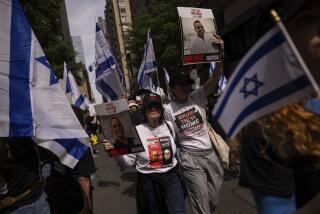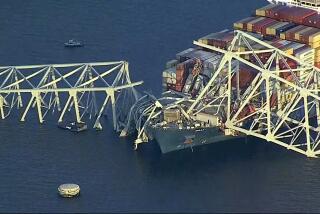Thousands still hope to find more than just anguish
NEW YORK — By Thursday, most people had run out of places to look.
Still, they gathered by the thousands at a Manhattan armory, sweat glistening from their brows as the sun baked down, hoping for news of loved ones.
Many faces were stained from tears, the fatigue of sleepless nights showing through. Others had taped color photos of relatives to their shirts.
“Call Mom!!” read one.
“Have you seen Myra Maldonado” read another. “She is the mother of two boys and is being missed terribly by her children, siblings and nephews.”
The number tells it all: 4,763 people were missing, most, if not all of them, likely crushed beneath the tons of debris of the World Trade Center. But still, the people looking for them had to hope. To do otherwise would be giving up.
Joe Boggio’s search started immediately -- as soon as he saw the fire from his offices a few blocks away he raced to call his girlfriend, Jody Tepedino. Not a half hour before, he’d walked her to the elevators at the north tower and kissed her goodbye, just like every morning.
As he dialed he watched the fire and smoke spread. The phone kept ringing, but there was no answer -- and no word since.
He’d sorted through rumors and Internet postings. He and Jody’s brother, Vincent Tepedino, visited every hospital Wednesday on the East Side of Manhattan -- clutching pictures of Jody. The black and white photos showed a 39-year-old woman with curly hair and a mouth stretched into a broad smile. In hospital after hospital -- so numerous they blurred in their memories -- they scanned patient lists and left fliers.
As they walked long city blocks to West Side hospitals, they got the call they had been praying for. Her name, another of Jody’s brothers said, was on a list of people hospitalized from Cantor Fitzgerald, an investment firm where she worked as an executive assistant for the last year.
For 15 minutes: joy.
Then came the follow-up call that filled them with dread. It was a mistake. It wasn’t true.
On foot to yet another hospital, Boggio and Tepedino heard that Jody’s company had opened a command center at the Pierre Hotel to help distraught families. Cantor Fitzgerald, with about 1,000 employees working in the tower, could find very few of them. But no one there knew anything about Jody.
Thursday, they took the train from Brooklyn again, this time to the armory -- a large brick building with the names of America’s bloodiest battles carved into the facade -- to fill out the missing person’s forms. What was the person’s height, weight, hospital of birth? Did the person have any distinguishing marks?
One woman, speaking into a cell phone to her friend’s family, sought more precise information. Was the birthmark on the back of her right thigh more of a flesh color or was it pink?
Nearby, David Mortman, 50, shook his head despairingly. He was searching for the son of friends stranded in Florida. The son, Nicholas Lassman, a 28-year-old Cantor Fitzgerald employee, worked on the 99th floor.
“This form,” said Mortman, grasping the six pages of information he was struggling to fill out. “This is the normal form -- so many people are never going to be found. There isn’t anything left to identify.”
For others searching fruitlessly, the days after the tragedy yielded shreds of information.
Harry Ramos’ family tried to reach every co-worker of the 45-year-old trader with the May Davis Group -- going down a list of names the Baltimore-based investing firm gave them.
They knew where he was when the plane struck his building -- at his desk on the phone with his wife. He told her something was wrong and that he was going to gather up his group and evacuate.
His wife waited Tuesday at home -- watching the news for any word, jumping each time the telephone ring.
Some news came Wednesday, but it was not good. A coworker who made it out had last seen Ramos on the 44th floor. He and the co-worker had stopped to help a man suffering chest pains. As the minutes passed, Ramos insisted the coworker keep going.
“The last he saw Harry a fireman was screaming at him to move to get the hell out,” said his brother-in-law, Ivan Cruz. “But he said Harry wouldn’t go.”
Still, the family held out hope. Like most everyone else, they have fliers with pictures and a phone number to call. Cruz shook with emotion as tears streamed from behind his sunglasses.
“It has been like a terrible dream,” he said.
Boggio -- like many others -- can’t help but think of the last moment he saw his girlfriend.
As was their ritual, he looked back as he left the concourse of the World Trade Center. She waited for him to turn, then smiled and waved.
“I just keep thinking of the big smile she gave me,” Boggio said. “”I will never stop looking for her -- looking for answers.”
More to Read
Sign up for Essential California
The most important California stories and recommendations in your inbox every morning.
You may occasionally receive promotional content from the Los Angeles Times.











